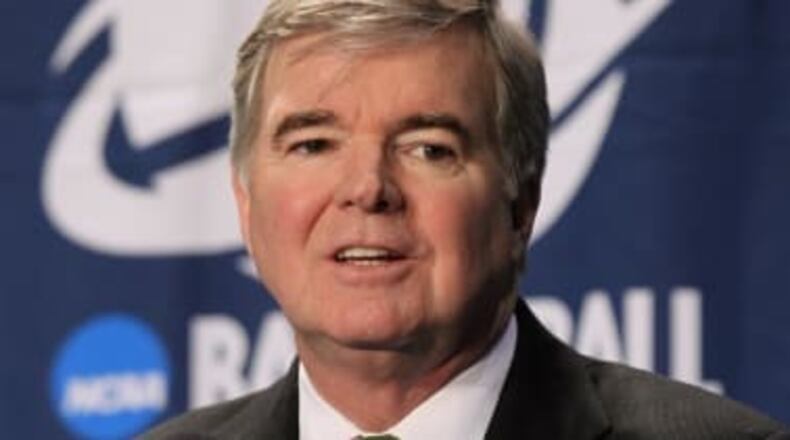NCAA President Mark Emmert, at Philips Arena for Saturday night’s South Regional final between Loyola-Chicago and Kansas State, was probably as surprised as anyone by the Elite Eight matchup.
“It’s called March Madness for a reason, right?” Emmert said in an interview with The Atlanta Journal-Constitution. “You look at this year, and it’s obviously been a little crazier than usual.”
Speaking shortly before tipoff, Emmert was looking forward to the improbable matchup of No. 9 seed vs. No. 11 seed for a berth in the Final Four. But not far from his mind, of course, was the storm that has rocked college basketball in recent months – a federal fraud and bribery investigation that has resulted in the indictment of four assistant coaches and a belated move to reform the sport.
“The whole situation is deeply disturbing to everybody,” Emmert said. “The rumors about that kind of behavior were swirling around. It wasn’t a great surprise to anyone that those things happened. Reading them all laid out like that is pretty disgusting stuff. What it has done is created enough impetus to make the kind of changes that we need to do to address it.
“The NCAA is a representative association – the rules are made by the member schools themselves – so it’s a democratic process. In order to get enough catalytic effect to get people to change in a speedy time, sometimes it takes a dramatic event, and unfortunately that’s what we’ve got on our hands – a very dramatic, very unpleasant event. So now we go out and we fix it.”
Emmert last fall appointed an independent commission, chaired by former U.S. Secretary of State Condoleezza Rice, to examine the sport’s failings and recommend changes.
Emmert said Saturday the commission is “working away like crazy” and is expected to make “some really strong and important” recommendations to the NCAA Division I board of governors on April 25. He expects those recommendations to lead to formal legislation that will be voted on in August.
“By the beginning of next season, we’ve got to have a number of really important substantive changes in place,” he said.
Emmert said he doesn’t know exactly what the commission will propose, but he expects its recommendations to address the NBA’s one-and-done rule, among other things.
Players “should be able to choose: Do I want to be a pro -- an employee -- or do I want to be a student?” Emmert said. “So we need to clarify that relationship. … Surely that will involve discussions with the NBA, too.”
Emmert also expects recommendations from the commission regarding relationships between players and agents, interactions with summer basketball leagues and dealings with shoe companies.
Another area of focus, he said, is the NCAA’s enforcement processes: “Are they strong enough and robust enough to get at these kind of problems?”
For Saturday night, though, Emmert settled in to enjoy a basketball game in Atlanta.
“We always love being here,” he said. “I was at LSU for a long time and came to Atlanta for a lot of ballgames. It’s a great sports town, and everybody is always welcoming.”
The NCAA will return to Atlanta in 2020 for the Final Four at Mercedes-Benz Stadium.
“I was there for the football championship (game on Jan. 8). It’s amazing,” Emmert said of the new stadium. “I love architecture, and it’s aesthetically a very beautiful building.
“I’m anxious, of course, to see it set up for a basketball game. … This is a community that supports sports so well that it should be a really, really good venue.”
Emmert said he isn’t concerned that no basketball game is scheduled for Mercedes-Benz Stadium as a trial run before the Final Four in two years.
“We’re not anticipating any problems,” he said.





